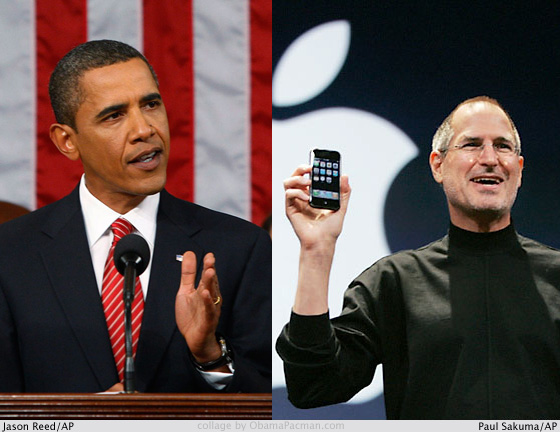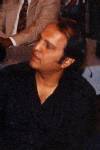
When Steve Jobs died of cancer on October 5, 2011, Obama – with whom he had shared some commonality of background and Muslim parentage – marked Jobs’ death with this tribute: “Brave enough to think differently, bold enough to believe he could change the world, and talented enough to do it.” -9to5Mac
Muslim Father, Two Americans
By Mowahid Hussain Shah

Two personalities have defined the millennial generation and the shape of 21st century US state and society. Both – President Obama and Apple founder Steve Jobs – are American men with Muslim fathers. Their mothers wed when interactions with Muslims were rare.
Obama’s father was rooted in Kenya carrying the name Barack Hussein Obama. He was an African foreign student who married a Caucasian American. He effectively abandoned the family when Obama was a toddler, and Obama saw him only once more when he was 10, in December 1971, when his father visited Hawaii.
The second marriage of Obama’s mother, Stanley Ann Dunham, was to Indonesian Muslim, Lolo Soetoro. Obama spent a formative phase of his school-going years in Jakarta. But Obama’s Muslim connection didn’t end here. His mother also lived in Lahore, ensuring an early Pakistani exposure.
While Obama changed the direction of American polity, Steve Jobs changed the way Americans live. He made complex technology seem simple yet elegant. He imagined, visualized, and anticipated what people wanted well before people knew what they wanted.
Steve Jobs’ mother, Joanne, fell in love with Abdulfattah Jandali, a Syrian Muslim studying in Wisconsin. In 1954, she accompanied Abdulfattah to his hometown in strife-torn Homs. Shortly after his US birth in 1955, Jobs’ parents gave him up for adoption, leaving thereby an abiding legacy of hurt and abandonment.
Years later, Abdulfattah recounted casually that successful technology people, including by then the famous Steve Jobs, would visit a California restaurant he managed, unaware that Steve Jobs was the son he abandoned at birth. Astonished at this news, Jobs, having not forgiven, had no desire to see him.
A movie, “Steve Jobs”, deals with the enduring legacy of his revolutionary product launches. Its precursor was his authorized biography by Walter Isaacson.
Although not a technical person, Jobs was a big picture visionary who had the astute judgment to place people and the persuasive skills to drive them to actualize his central vision. It led to Apple, Macintosh, and iMac computers.
Co-founding Apple Computers in 1976, he envisioned a world where every person would own a computer. In 2001, he revolutionized the digital music market with the iPod, a pocket-sized music player that could store 1,000 songs. In 2003, he connected it with iTunes, an online store of more than 1 million songs. In January 2007, he introduced the iPhone, a smart touchscreen phone with email, basic camera, browser, and mini-programs called apps. Email and Internet became accessible 24 hours a day, and camera phones eventually replaced snapshot cameras. In 2010, Jobs unveiled the iPad, a tablet running apps with which iPhone users were already familiar, but which was much larger, making viewing of videos, Internet, and movies more practical to view. All of this now dominates the routine of living.
When Steve Jobs died of cancer on October 5, 2011, Obama – with whom he had shared some commonality of background and Muslim parentage – marked Jobs’ death with this tribute: “Brave enough to think differently, bold enough to believe he could change the world, and talented enough to do it.”

